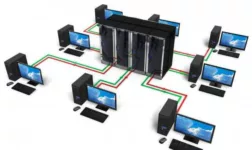For many people, even those who consider themselves relatively computer savvy, as soon as you start talking about networks and servers a chill goes through their hearts. Just saying the word ‘server’ gets you thinking about locked rooms with dozens of floor to ceiling racks filled with mysterious boxes, flashing lights and miles of color-coded wires all maintained by condescending IT people.
If you’ve already got the room, the boxes and the network is up and running then you’re all set (although you’re pretty much at the mercy of the IT folks if something breaks or you need to expand).
But what if you are just starting out, your business is growing, you need to bring on more people and let’s face it, ‘sneaker netting’ your files around the office using USB sticks just isn’t going to cut it anymore. You could try and teach yourself everything you need to know in order to set up networks and servers, you could hire an expensive IT guy or gal or you could go to a shop that specializes in setting up those things for you.
We had the chance to talk to Soroush Madjzoob, co-founder of The Other Guys, and asked him some straightforward questions about buying server and network equipment.
When do I know when my business needs a dedicated server?
I think the answer is different for different people and different businesses; but, a good rule of thumb is between five to ten users. In my 22+ years of experience, I have found that users begin to coalesce into some kind of a peer-to-peer network around five users; which keeps their data fragmented across multiple computers. The trigger, typically, is when they need central access to data, databases, accounting or otherwise for central management of security and backup.
So exactly what is a server anyway?
Basically a server is any computer that is dedicated to running one or multiple [server] applications such as mail servers, network servers, application servers, print servers, web servers, etc. They don’t necessarily have to be custom-built for that specific purpose, they just have to be able to run the server applications you need them to. Even older, less expensive or even refurbished computers can be used as servers. However, as I often tell my clients: “you want to try and bulletproof your server(s); as much as possible!” And here’s the logic behind it: your servers are the life blood of your company, if they crash, your company crashes! So you want to take, a reasonable precaution, to eliminate single points of failure in your server’s architecture. That’s why a true ‘server-class’ computer has multiple levels of redundancies and typically has hot-plug capabilities.
What kinds of components do I need for my server hardware?
Surprisingly you don’t need much for the actual server to do its job, it just has to have enough processing power and RAM to run the software; and support the load crated by your users – both internal and external to your office. You don’t need a powerful graphics card, a fancy monitor or a printer. In fact, once you get the system up and running you may never turn on the monitor or need to use the keyboard except when things go wrong or you need to upgrade your system.
The key requirements of traditional server hardware (apart from being able to run the software and handle all the requests from users) are reliability, availability and, in many cases, redundancy. Servers are the workhorses of computers. They need to run constantly, 24/7 so many servers have industrial-strength and sometimes redundant power supplies. For these reasons, they typically have a RAID based storage sub-system; giving redundancy to disks and protecting the data against single hard drive failures. They also use error-correcting RAM to try and correct any errors on the fly. Their startup sequences may perform more system checks than a typical desktop machine. They need a high-speed connection to the network, they may also need a fast Internet connection and, as you might expect, they usually require industrial-strength cooling systems to keep everything from melting down.
Can you explain what a RAID system is?
The evolution of RAID and the number of options are so numerous that they deserve an entire article, but, in short, a RAID system (Redundant Array of Independent Disks) is simply a bunch of interconnected hard disk drives that behave like one giant external hard disk. They can be configured for speed or security or a combination of both. They are usually set up so that if one of the drives fails the other drives can recover the information that was stored there and continue operating until a replacement drive can be installed.
What other equipment am I going to need?
Even if you live in an area where there are no intermittent power outages or fluctuations in your voltage you should consider buying a UPS (Uninterruptable Power Supply) and in severe cases a line conditioner.
Next, since we talked about servers being the life blood your company; then Switches (used to be called Hubs) are the life blood of your network! Switches are responsible for passing communication between all the devices on your network – all devices! A good, reliable Switch, should run over 5 years easily; typically 10 years! Since they are so important to your network don’t skimp on the switches!
Lastly, everyone has heard of Firewalls/Routers. There is a sea of information about Firewalls and Routers and they really deserve their own articles but, within the scope of this interview, we can cover the basics. A Router’s function is like a traffic cop; routing communication from one zone to another zone; a Firewall’s function is like a bouncer at a club; blocking unwanted traffic from entering your secured zone. For most of the small to medium sized companies, there are only two zones: Internal Network and the Internet. In the old days, Routers and Firewalls were two separate devices; now, typically, they are integrated into a single appliance.
There are a number of other topics such as operating systems, security, infrastructure and more and we’ll talk about those aspects in a future interview. For now, if you have questions about buying and setting up a network, servers or RAID systems for your business you can contact Santech Network Solutions for a free consulting session.








